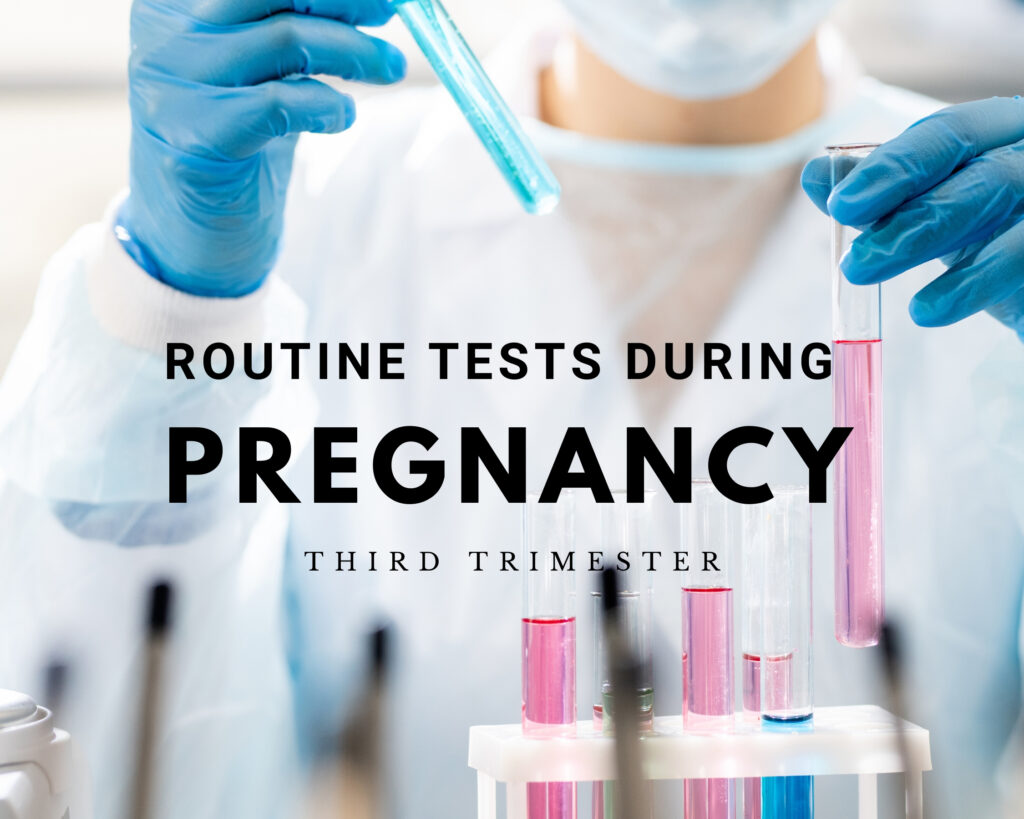Routine Tests during Pregnancy|First Trimester
Routine Tests during Pregnancy|First Trimester. Once you learn that you are pregnant, you’ll be visiting your doctor pretty regularly. These visits will include tests and screenings to make sure you are healthy, your baby is healthy, and your pregnancy is progressing normally.
For the first trimester, expecting mothers will typically go to the doctor about every four weeks. However, because of COVID-19 restrictions, you might only be able to visit with your doctor in person once or twice. During your appointment, your doctor will want to run several important tests to check on your health and your baby’s, including blood tests, urine tests, and, of course, the ultrasound. Routine Tests during Pregnancy|First Trimester.
These tests check for any abnormalities your doctor should be aware of as well as determine your blood type and your due date, among other things.

Urine Tests
At every visit with your doctor, you’ll have to give a sample of your urine. A urinalysis will let your doctor know if you have any conditions that need further treatment. While peeing into a cup every few weeks isn’t exactly a fun activity, it’s a necessary part of a healthy pregnancy. Here are some conditions that are found through urinalysis and how to treat them:
- Urinary Tract Infection, or UTI, is detected by blood cells or bacteria in the urine. UTIs can be treated easily with antibiotics.
- Diabetes is detected by levels of glucose in your urine. During your first prenatal doctor’s visit, you’ll tell your doctor of any medical conditions you have, including diabetes, but some women develop gestational diabetes during their pregnancy that can lead to problems in labor and affect your newborn. Gestational diabetes is treated with diet and lifestyle changes and sometimes medication.
- Preeclampsia, or pregnancy-induced high blood pressure, is detected by high levels of protein in your urine. Many women who are diagnosed with preeclampsia already had high blood pressure problems before becoming pregnant. If left untreated, preeclampsia can cause problems during labor and may damage your liver and kidneys. Preeclampsia is treated with lifestyle changes, blood pressure monitoring, and in severe cases, medication and early delivery.
Blood Tests
At your first prenatal doctor’s visit, your doctor will take a blood sample to check out some of, if not all, of the following:
- Your hCG levels, a hormone that shows up in both blood and urine once you’re pregnant, can help your doctor determine your due date by measuring the amount of hCG in your blood.
- Your Rh factor blood type is something you may not have been aware of until your pregnancy. But when you’re pregnant, knowing your Rh factor and your baby’s is important. Around 15 percent of people are Rh-negative. If a mother is Rh-negative and her baby is Rh-positive, it’s referred to as “Rh incompatibility” and can sometimes lead to complications with pregnancy.
- Your blood type is important to know if you end up needing a transfusion during labor.
- Your immunity to certain diseases can be detected by a blood test, as well as your genetic risk for developing others.
Additional complications that are detected by blood tests include sexually transmitted infections, high blood sugar, and vitamin D deficiency.
Pap smear
Most women, pregnant or not, are familiar with the necessity of a pap smear. A pap smear is just another important test your doctor will do at your first prenatal appointment.
During your prenatal pap smear, your doctor will collect cells from your cervix to check for any abnormalities and sexually transmitted infections, or STIs, such as gonorrhea, chlamydia, syphilis, HPV, and HIV. Most sexually transmitted infections are treated with antibiotics.
If left untreated, an STI can lead to your newborn having complications once he or she is born.
Noninvasive Prenatal Testing, or NIPT
Noninvasive prenatal testing is done to all expecting mothers to determine whether the baby could be born with a genetic disorder like Down syndrome.
NIPT is a simple blood test that can be done as early as week nine of your pregnancy. While NIPT can’t determine for certain that your baby will be born with a genetic disorder, studies have found that NIPT are about 97% accurate.
NIPT checks for the most common chromosomal disorders, including Down syndrome, Edwards syndrome, and Patau syndrome. If your blood tests positive for any of these disorders, your doctor will most likely want to do additional testing to confirm the results.
Anticipating the results of your NIPT can be stressful. Knowing as early as possible can be beneficial. The sooner you know, the more time you have to prepare for delivering a baby with special needs. Be sure to ask your doctor any and all questions you may have about the test and the possibility of a positive result.
First Ultrasound
One of the most exciting doctor’s appointments for expecting parents is the first ultrasound. With improving technology, moms and dads can hear their baby’s heartbeat, see their shape on the screen, and even get to take home a photo of their baby to show their loved ones, though, in the first couple months of pregnancy, there won’t be too much to see. What an exciting day!
During the first trimester, you’ll probably have your first ultrasound between weeks six and nine. You’ll typically have another ultrasound during the second trimester.
With an ultrasound, your doctor can determine the following:
- Heartbeat
- Location of the fetus in the uterus (as opposed to the fallopian tubes)
- Approximate due date
- Number of fetuses
As your baby grows, you’ll be able to see more of him in your ultrasounds. And, at your second-trimester ultrasound, your doctor will be able to determine your baby’s gender!
Making regular trips to your doctor can be a hassle, especially when you’re expected to give urine and blood samples. But knowing your baby is growing healthily is worth every minute of it! Keep in contact with your doctor about any concerns you have about screenings and what you should expect for appointments in the later trimesters.



Sally Salerno is an Award Winning Newborn Photographer in the Raleigh / Durham Area
If you are interested in booking a session with Sally Salerno, click here.





